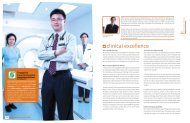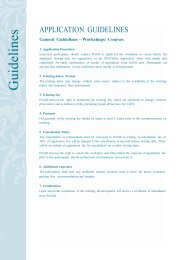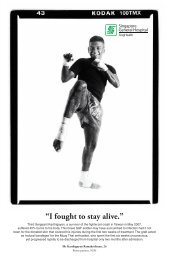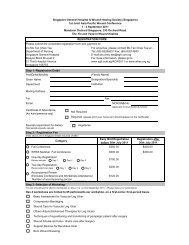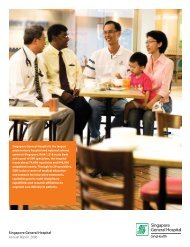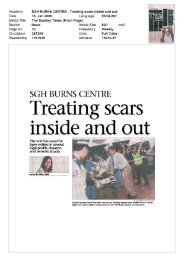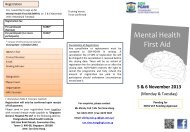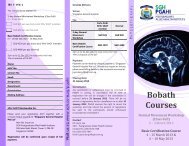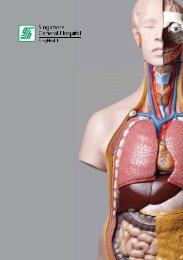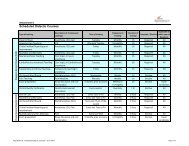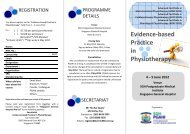Want to know more about Music Therapy Programme - Singapore ...
Want to know more about Music Therapy Programme - Singapore ...
Want to know more about Music Therapy Programme - Singapore ...
Create successful ePaper yourself
Turn your PDF publications into a flip-book with our unique Google optimized e-Paper software.
When <strong>Music</strong> Speaks.....<br />
At the SGH Centre for Hearing and Ear Implants, we believe that<br />
most children with hearing impairment have the potential not<br />
only <strong>to</strong> hear, but <strong>to</strong> listen, and associate sound with meaning.<br />
Since 2001, the Listen & Talk <strong>Programme</strong> has been helping<br />
children with various degrees of hearing impairment <strong>to</strong> listen<br />
and use spoken language <strong>to</strong> communicate and <strong>to</strong> lead normal<br />
lives, through its Audi<strong>to</strong>ry-Verbal <strong>Therapy</strong> and other services.<br />
<strong>Music</strong><br />
<strong>to</strong><br />
theE<br />
ars<br />
<strong>Music</strong> <strong>Therapy</strong> <strong>Programme</strong> by the<br />
Centre for Hearing and Ear Implants<br />
<strong>Music</strong> can motivate these hearing-impaired children <strong>to</strong> achieve<br />
even better learning outcome and enhance their speech and<br />
language development.<br />
“It is easy <strong>to</strong> assume that music would be an inappropriate<br />
therapeutic medium for children with hearing losses because music<br />
is considered primarily an audi<strong>to</strong>ry art form. However, some aspects<br />
of music, such as its vibro-tactile features, wide frequency range,<br />
and common pairing with lyrics, make it a useful <strong>to</strong>ol for promoting<br />
language development, social and emotional well being, and for<br />
encouraging optimal use of residual hearing. Research studies have<br />
shown that music therapy is a useful <strong>to</strong>ol for therapeutic aims such<br />
as speech production, the development of vocabulary, and sound<br />
awareness or discrimination.”<br />
Kate Gfeller, PhD. Professor of <strong>Music</strong> <strong>Therapy</strong>; Speech Pathology &<br />
Audiology at the University of Iowa<br />
Contact Us<br />
For <strong>more</strong> information on the <strong>Music</strong> <strong>Therapy</strong> <strong>Programme</strong> or other services<br />
provided by the Centre, please contact us at:<br />
Centre for Hearing & Ear Implants<br />
Block 3 Basement 1, ENT Centre<br />
<strong>Singapore</strong> General Hospital<br />
Outram Road<br />
<strong>Singapore</strong> 169608<br />
Phone: 6326 5404 / 6872<br />
Fax: 6321 3523 / 6326 6307<br />
Email: golisten@sgh.com.sg<br />
Website: www.sgh.com.sg/ListenAndTalk/<br />
Supported by:
What is <strong>Music</strong> <strong>to</strong> the Ears?<br />
<strong>Music</strong> <strong>to</strong> the Ears is an individualised music therapy programme<br />
specially designed for hearing impaired children. Offered by<br />
a Board-Certified <strong>Music</strong> Therapist, <strong>Music</strong> <strong>to</strong> the Ears aims <strong>to</strong><br />
provide the children with a multi-sensory approach <strong>to</strong> learning<br />
through a fun and interactive music-making experience.<br />
Benefits of <strong>Music</strong> <strong>Therapy</strong><br />
<strong>Music</strong> therapy techniques can effectively work on issues related<br />
<strong>to</strong> prosodic features of speech, such as rhythm, in<strong>to</strong>nation, rate<br />
and stress. Breathing, timing, pitch and articulation needed for<br />
singing songs have positive effects on speech.<br />
Vocal training on fundamental frequency and singing songs in<br />
appropriate keys also help <strong>to</strong> improve speech intelligibility.<br />
<strong>Music</strong>al experience also improves the child’s motivation as it<br />
provides a multi-sensory approach <strong>to</strong> learning that can help the<br />
child <strong>to</strong> internalise the meaning of new words.<br />
What is <strong>Music</strong> <strong>Therapy</strong>?<br />
<strong>Music</strong> therapy is an established allied health profession where<br />
music and music activities are used <strong>to</strong> address physical,<br />
psychological, cognitive and social needs of individuals. It is<br />
the clinical and evidence-based use of music interventions<br />
<strong>to</strong> accomplish individualised goals within a therapeutic<br />
relationship by a qualified professional who has completed an<br />
approved music therapy programme (American <strong>Music</strong> <strong>Therapy</strong><br />
Association Definition, 2005).<br />
<strong>Music</strong> therapy is proven <strong>to</strong> have dramatic effects on individuals<br />
of various ages and abilities. It is applicable but not limited <strong>to</strong><br />
critical care, developmental disabilities, emotional trauma, geriatric<br />
care, hearing/speech & language/ visual impairment, psychiatric,<br />
neonatal care, obstetrics, cancer and physical disabilities.<br />
In hospitals, music can be used <strong>to</strong> alleviate pain in conjunction<br />
with anaesthesia or pain medication, elevate patients’ mood and<br />
counteract depression, promote physical rehabilitation, induce<br />
sleep, reduce muscle tension for relaxation and maintain a<br />
person’s quality of life.<br />
In a music therapy programme, the child not only learns <strong>about</strong><br />
music itself but also benefits from being able <strong>to</strong> do a task which<br />
a typically hearing child can do.<br />
<strong>Music</strong>al activities provide children with an effective avenue for<br />
expressing their emotions. Studies have shown that adding<br />
music <strong>to</strong> the rehabilitation process increases the uptake of new<br />
concepts and improves the child’s motivation <strong>to</strong> learn.<br />
Who can benefit from<br />
<strong>Music</strong> <strong>to</strong> the Ears?<br />
<strong>Music</strong> therapy is recommended as an intervention approach<br />
which compliments Audi<strong>to</strong>ry-Verbal <strong>Therapy</strong>, for individuals<br />
who are fitted with hearing devices. It is also recommended for<br />
children with Audi<strong>to</strong>ry Processing Disorder.



![help document [pdf]](https://img.yumpu.com/26291587/1/190x245/help-document-pdf.jpg?quality=85)
